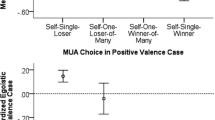Abstract
When there are equally strong claimants for a scarce good, lotteries are often argued to be a fair method of allocation. This paper reproduces four of the views on the fairness of lotteries that have been presented in the literature: the distributive view; the preference view; the actual consent view; and the expressive view. It argues that these four views cannot offer plausible explanations for the fairness of lotteries. The distributive view is argued to be inadequate because, even though receiving expectations to a good is of value to the participants, this value cannot plausibly make a contribution to the satisfaction of a participant’s claim. Both the preference and actual consent views are argued to be implausible because they lead to accepting procedures as legitimate that fail to correspond with what a claim is. Finally, it is contended that the expressive view identifies a value that is relevant to respecting equal claimants, but that cannot plausibly be related to a procedure’s fairness. The paper concludes by maintaining that an equal treatment view can accept all the valid insights from these four views without needing to accept their untenable implications.
Similar content being viewed by others
Notes
Though Stone (2007, 2011) and Kornhauser and Sager (1988) speak of the ‘justness’ of lotteries rather than their fairness, they are using justness in a rather narrow sense of what would normally be called fairness. This is evident implicitly in the discussion by Kornhauser and Sager, and explicitly in Stone’s discussions (see e.g., Stone 2010, p. 152; Stone 2011, pp. 53, 105).
I proceed here on the basis of Kornhauser and Sager’s discussion. Nevertheless, both Wasserman (1996, pp. 46–48) and I have argued that Broome’s popular view on the fairness of lotteries (1984a, 1990–1991, 1991) also requires the accuracy of a weak version of the distributive view. I would, therefore, suggest that some of the points raised here also undermine Broome’s view.
Broome (1984b) has also presented an argument that even though equality in utility might be valuable, it does not follow that equality in expected utility has any value; he also argued that random selection could not plausibly be justified in order to equalize expected utilities.
Note that Stone does not contend that Sher directly presents an actually consent view. Instead Stone argues that for Sher ‘what matters is whether the strongest claimants would grant permission if asked, regardless of whether or not permission is in fact asked’ (Stone 2008, p. 580).
By statistical probabilities, Wasserman (1996, p. 30, n. 2) means probabilities that should be understood either in terms of frequencies or propensities.
The results of the 1970 draft lottery were even contested in three legal trials at the time, though all upheld the results as legally binding. See Stodolsky versus Hershey, 2 S.S.L.R. 3527 (W.D. Wis. 1969); U.S. versus Kotrlik & Gaevert, 465 F.2d 976 (9th Cir. 1972); U.S. versus Johnson, 473 F.2d 677 (9th Cir. 1972).
References
Broome, John. 1984a. Selecting people randomly. Ethics 95: 38–55.
Broome, John. 1984b. Uncertainty and fairness. The Economic Journal 94: 624–632.
Broome, John. 1990–1991. Fairness. Proceedings of the Aristotelian Society 91: 87–101.
Broome, John. 1991. Weighing goods: Equality, uncertainty and time. Oxford: Basil Blackwell.
Burgers, Jan-Willem. 2014. The fairness of lotteries: An equal treatment view. Unpublished paper.
Cohen, Gerry. 1989. On the currency of egalitarian justice. Ethics 99: 906–944.
Dworkin, Ronald. 2000. Sovereign virtue: The theory and practice of equality. Cambridge: Harvard University Press.
Feinberg, Joel. 1965. The expressive function of punishment. The Monist 49: 397–423.
Fienberg, Stephen. 1971. Randomization and social affairs: The 1970 draft lottery. Science 171: 255–261.
Kornhauser, Lewis, and Lawrence Sager. 1988. Just lotteries. Social Science Information 27: 483–516.
Rosenbaum, David. 1970. Statisticians charge draft lottery was not random. New York Times, January 4:66.
Saunders, Ben. 2010. Fairness between competing claims. Res Publica 16: 41–55.
Scheffler, Samuel. 2003. What is egalitarianism? Philosophy and Public Affairs 31: 5–39.
Sher, George. 1980. What makes a lottery fair? Noûs 14: 203–216.
Starr, Norton. 1997. Nonrandom risk: The 1970 draft lottery. Journal of Statistics Education, 5. www.amstat.org/publications/jse/v5n2/datasets.starr.html .
Stone, Peter. 2007. Why lotteries are just. Journal of Political Philosophy 15: 276–295.
Stone, Peter. 2008. On fair lotteries. Social Theory and Practice 34: 573–590.
Stone, Peter. 2010. Three arguments for lotteries. Social Science Information 49: 147–163.
Stone, Peter. 2011. The luck of the draw: The role of lotteries in decision making. Oxford: Oxford University Press.
Wasserman, David. 1996. Let them eat chances: Probability and distributive justice. Economics and Philosophy 12: 29–49.
Acknowledgments
For their helpful criticisms and suggestions, I would like to thank Geoffrey Brennan, Alan Hájek, Paul ‘t Hart, Nicholas Southwood, and Peter Stone. I would also like to thank the two anonymous referees for their extensive and helpful comments.
Author information
Authors and Affiliations
Corresponding author
Rights and permissions
About this article
Cite this article
Burgers, JW. Perspectives on the Fairness of Lotteries. Res Publica 22, 209–224 (2016). https://doi.org/10.1007/s11158-014-9265-7
Published:
Issue Date:
DOI: https://doi.org/10.1007/s11158-014-9265-7



